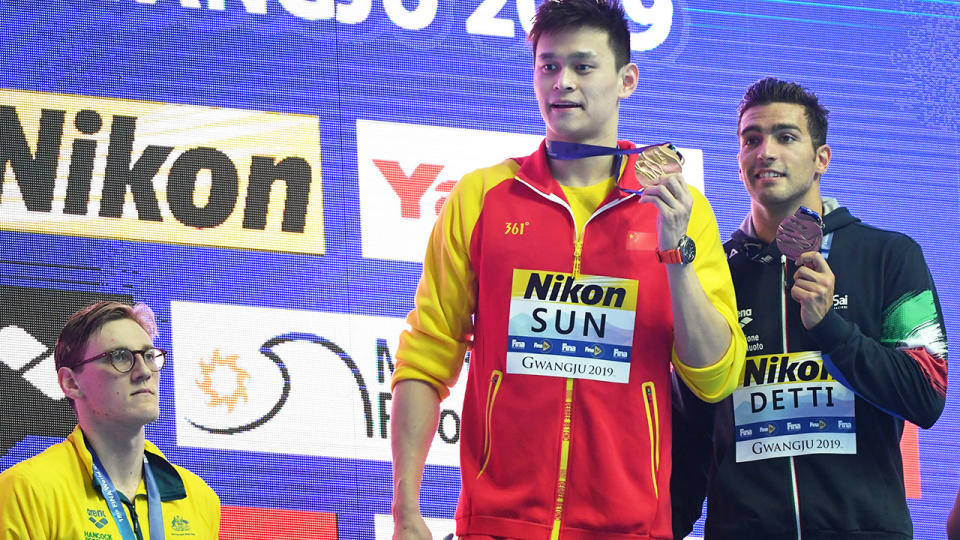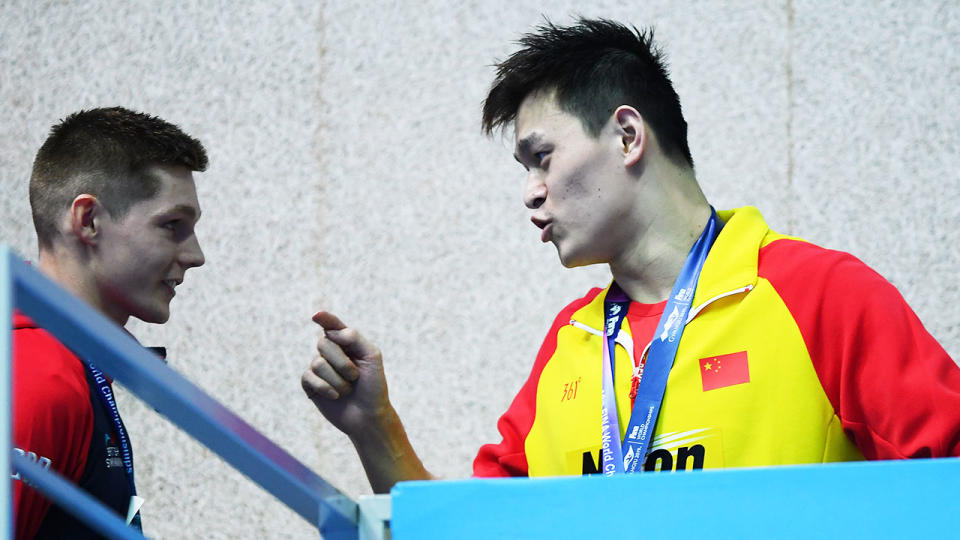Rare doping hearing to determine swimmer Sun Yang's fate
One of China’s biggest Olympic stars will undergo a rare public hearing in a doping case on Friday with his 2020 Tokyo Games place at stake.
Three-time gold medalist swimmer Sun Yang is facing a World Anti-Doping Agency appeal in Switzerland that seeks to ban him for up to eight years for allegedly refusing to give samples voluntarily.
The Chinese swimmer proved a highly controversial figure at July’s world championships, where Australian Mack Horton famously led the protests against his right to compete.
‘DINING HALL ERUPTED’: Fellow swimmers' epic reaction to Horton protest
DISGUSTING: Girlfriend targeted in ugly twist to Mack Horton controversy
The case is notorious for a vial of his blood being smashed with a hammer by his bodyguard. Sun allegedly helped by lighting the scene with his cellphone.
It’s a colourful detail of a late-night dispute between Sun’s entourage and officials trying to take blood and urine samples after visiting his home in China.

However, much of the case hangs on protocol and paperwork: Did the three anti-doping officials in China conduct themselves properly and have correct authorisation documents to make their September 2018 visit valid?
A tribunal appointed by world swim body FINA sided with Sun and merely warned him - though noted “it was a close-run thing.”
“It is safe to describe the entire (visit) as problematic, highly unusual and, at times, confrontational,” the FINA panel wrote in a 59-page ruling, also noting “troubling and rather aggressive” conduct by Sun and his entourage.
WADA believes Sun violated rules by refusing to provide samples requested on a properly scheduled visit. The agency challenged the FINA panel’s verdict with the Court of Arbitration for Sport.
Sun countered by opting to have evidence and testimony aired in a first open-court CAS hearing for 20 years.
The Sun Yang controversy has erupted overnight with another swimmer staging a podium protest.#9WWOS #Swimming pic.twitter.com/zCGoeswsT7
— Wide World of Sports (@wwos) July 23, 2019
More than 100 media are expected at a Swiss lakeside hotel in the upscale, jazz festival city of Montreux. An online live stream will intrigue lawyers monitoring worldwide.
His 11 world titles include the 200 and 400 freestyle in July that provoked anger in opponents.
Medalists Mack Horton of Australia and Duncan Scott of Britain refused to stand with him on the podium in South Korea.
Polarising figure
Horton went as far as accusing Sun of being a cheat as rivalries flared at the 2016 Olympics, and bad feeling continued into the 2019 worlds.
Son tested positive for a banned stimulant, citing a prescribed heart medication, and served a three-month ban in 2014. Soon after he won three titles at the Asian Games. WADA did not challenge that Chinese ruling.
Secrecy about the case fuelled skepticism over special treatment. China’s sports authorities and FINA published no details until after the ban ended.
This year, American, Australian and British swimmers objected to Sun competing at the worlds while WADA’s appeal was pending.

Amid crowd boos, Sun told the protesting Scott poolside: “You're a loser. I'm a winner."
First verdict
The three FINA judges said Sun was “foolish in the extreme” to allegedly gamble on his version of events beating charges he evaded and tampered with a sample.
Still, the panel wrote of “compelling justification” for Sun not to deal with a chaperone whose conduct was “extremely unprofessional.” The chaperone did not testify.
The nurse’s qualification was also questioned and the collection visit was ruled “invalid and void.”
Its confidential verdict dated Jan. 3 leaked that month to Britain’s Sunday Times.
Public hearning
In 35 years and thousands of cases, only once has CAS opened its doors for a hearing.
It also involved a three-time Olympic champion swimmer who chose a public arena to answer allegations of tampering with a doping sample.

Michelle Smith de Bruin starred for Ireland at the 1996 Atlanta Games amid widespread suspicion about her improved performances.
In January 1998, a urine sample taken from her was corrupted with a large amount of alcohol.
A CAS panel in 1999 upheld a four-year ban imposed by FINA.
Second verdict
If the CAS panel upholds the appeal, Sun’s previous ban means he risks a heavier sanction for a second offense.
WADA wants a ban of two to eight years. It is unclear when it would start.
A two-year ban backdated to September 2018 would bar Sun from the Tokyo Olympics and strip him of recent world titles. It could end the career of Sun, who turns 28 on Dec. 1.
The verdict from three CAS judges is expected early next year.
